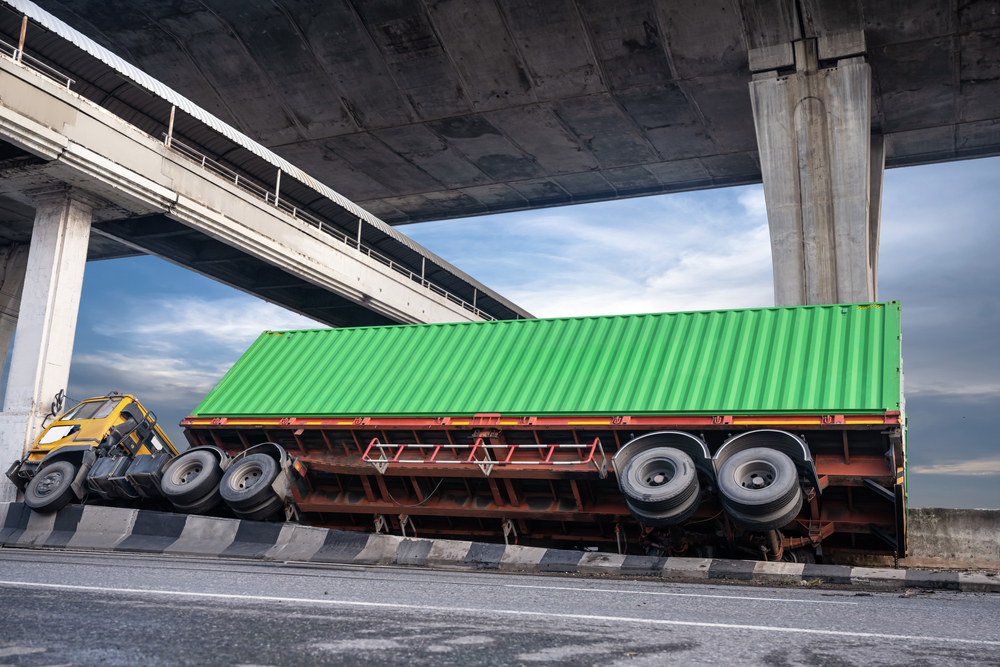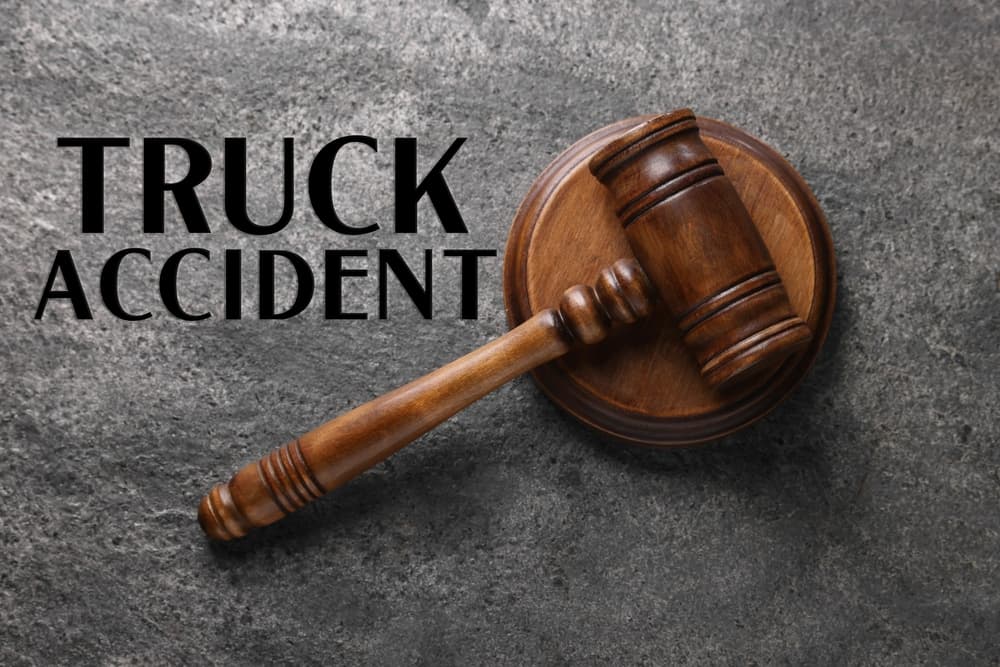A truck accident is one of the most dangerous events on U.S. roads, resulting in significant injuries, fatalities, and property damage. Many variables contribute to the complexity of these incidents, including the many types of commercial vehicles involved, the multiple parties held accountable, and the trucking industry’s complicated federal and state rules. Consulting a truck accident lawyer can help victims navigate these complexities, identify liable parties, and secure fair compensation.
Schedule A Free Case Evaluation Today!
Common Causes of Truck Accidents
Highway records attribute truck accidents to distracted driving, driver fatigue, substance abuse, recklessness, poor training, maintenance issues, weather hazards, and road conditions. The following information provides a more in-depth look at why these accidents happen.
Distracted Driving
Driver conduct is one of the leading causes of truck accidents. Distracted driving has increased in prevalence as technology has advanced.
While GPS and communication gadgets are vital for contemporary trucking operations, they can cause drivers to lose focus on the road. Even minor diversions may be deadly while driving large trucks at highway speeds.
Driver Fatigue
Driver weariness is another significant safety hazard. Despite federal hours of service laws that limit driving time, many drivers are under pressure to achieve tight delivery times. Long-distance driving may be boring. When paired with irregular sleep habits and health difficulties, a driver may not respond in enough time.
Substance Abuse
Substance addiction is rampant in the transportation sector. While random drug testing and rigorous rules exist to prevent impaired driving, some drivers use stimulants to keep them awake or to deal with their job demands. These drugs can significantly impair judgment, coordination, and response speed.
Speeding and Recklessness
Drivers may speed up because of delivery demands. When this happens, the time it takes to stop can also increase exponentially the faster a driver goes. Speeding also increases the impact of a wreck.
Poor Training or a Lack of Experience
Inexperienced or improperly trained drivers are another significant danger factor. Driving a commercial truck requires intensive training and knowledge of vehicle operation. However, due to the current shortage of drivers, some employers speed up training programs or reduce the recruiting criteria, potentially putting unprepared drivers behind the wheel.
Maintenance Issues
Trucking companies must maintain their trucks to avoid accidents. Accidents often happen when a company does not adequately maintain brakes, tires, or suspension and steering systems. Even a slight technical error can cause a significant accident.
Weathering a Storm
Truckers can experience accidents during rainy conditions due to a lack of traction and visibility on the roadway. They can also have problems keeping on the road during ice or snow storms.
If they must drive on a windy day, they may also find it challenging to stay on the road. Foggy conditions limit a driver’s ability to see the road and may cause a multiple-vehicle pileup.
Road and Highway Conditions
Roads become dangerous when a city does not adequately maintain them. Accidents may also happen if a jurisdiction does not provide enough signage to reduce hazards on the road. Truckers can face risks in construction zones and restricted roads. Engineers classify roads and designate speeds based on a road’s purpose and design. If drivers are used to driving interstate highways, they may be more careless when driving on an arterial or collector road.
Types of Commercial Trucks Involved In Accidents

Trucks come in different makes and models. Semi-trucks, also known as 18-wheelers, are especially dangerous. When they carry a large load, they can weigh 80,000 pounds.
- Cement trucks, with their high center of gravity and rotating concrete drums, are particularly unstable, especially when turning or stopping abruptly.
- Flatbed trucks carry a variety of cargo, and if not properly secured, this cargo can shift or fall off, causing serious accidents.
- Tanker trucks transport liquids and gases. They are susceptible to liquid surges, which affect their stability, and they often carry hazardous materials, increasing the risk of spills or explosions.
- Dump trucks operate in construction and mining areas. Drivers may experience reduced visibility or have trouble with stability when raising the truck’s bed.
- Smaller box trucks and delivery vehicles are dangerous if the driver stops often or must operate the truck in tight spots in a city. Drivers may get involved in accidents if they’re facing a delivery deadline.
Types of Truck Accidents
Truck accidents fall under these classifications:
- Rollovers happen when a vehicle flips over on its side or topsy-turvy on the roof after a driver speeds around a bend, steers too quickly, or hits a high wind. A rollover can happen if a cargo loader does not load a truck properly. Poor loading can lead to a shift, causing a truck to land on its side.
- Jack-knife incidents occur when a truck’s trailer swings at a sharp angle to the cab (like a folding knife). Poor braking, sloppy or slippery roadways, or abrupt directional changes usually cause the incidents.
- Tire blowouts are sudden tire failures caused by poor maintenance, overloading, or road hazards, which can lead to loss of vehicle control.
- Wide-turn incidents happen when heavy trucks swing wide to perform tight turns, potentially impacting cars in neighboring lanes or crushing anyone trapped in the turning radius.
- T-bone collisions occur when a truck meets the side of another vehicle at a perpendicular angle. They occur most often at intersections when one party fails to stop at a red light or stop sign.
- Rear-end crashes occur when a truck strikes or is struck from behind, usually because the driver follows too closely or cannot stop quickly due to the truck’s extended braking distance.
- Head-on accidents are direct front-to-front collisions typically caused by lane exits or wrong-way driving. They rank among the deadliest truck accidents.
- Sideswipes occur when a truck makes lateral contact with another vehicle, usually while changing lanes or merging. Blind spots and improper lane changes can also cause sideswipes.
Schedule A Free Case Evaluation Today!
Determining Liability for Truck Accidents
Determining liability in truck accidents is complicated. An attorney usually must review the actions or inaction of several parties. Litigants that may be liable include the truck driver, the trucking company, the cargo loading company, a truck parts or vehicle manufacturer, and the maintenance provider,
The Driver
Truck drivers may be held principally responsible for accidents caused by their actions or judgments. Drivers may crash because of distracted driving, speeding, or disobeying traffic laws and safety requirements. Often, an attorney must look at the hours-of-service regulations and log data to see if the driver followed the road rules for driving times and rest breaks.
The Company
Trucking businesses can share liability under various legal concepts, including vicarious liability for their workers’ activities. Companies may be held directly responsible for accidents caused by poor training programs, improper scheduling, or a failure to maintain their fleet.
The Cargo Loader
Cargo goods loading businesses play an essential role in truck safety and may be responsible for accidents caused by inadequately loaded or secured goods. It includes mishaps caused by unequal weight distribution, overloading, or improperly secured equipment.
The Maintenance Provider
Maintenance providers may be held accountable for accidents caused by mechanical breakdowns that could and should have been prevented.
The Vehicle and Parts Manufacturer
Vehicle and parts manufacturers may be held accountable for accidents caused by faulty parts or design mistakes. It comprises the braking system, steering components, tires, and other key truck systems. These lawsuits frequently involve complicated product liability rules and require a detailed and lengthy technical investigation.
Special Regulations in the Trucking Industry: Understanding Common Violations
Below are some of the most critical trucking regulations and how drivers and others may circumvent them—another reason truck accidents happen.
Hours-of-Service (HOS) Regulations
One of the most commonly violated requirements is the Federal Motor Carrier Safety Administration’s (FMSCA’s) Hours of Service (HOS) restrictions.
These guidelines limit driving times to reduce fatigue-related accidents. Regulators set truck driving times up to 11 hours within a 14-hour window after a shift begins. An obligatory 10-hour rest interval follows this rule. Companies require drivers to take a 30-minute break after driving for eight hours.
Unfortunately, economic demands and tight delivery timetables sometimes cause drivers to violate these restrictions. Some drivers keep two logbooks: one for inspectors that shows compliance hours and another that records real driving time.
The advent of Electronic Logging Devices (ELDs) has made this practice more difficult, although some drivers continue to find ways to sidestep the rules, such as logging “on duty, not driving” time while driving.
Weight Limits and Load Security
Commercial vehicles must follow rigorous weight limitations on interstate routes, which generally range from 80,000 pounds gross vehicle weight. Weight limitations vary per state. Some trucking firms and drivers violate these regulations by overloading their trailers to maximize revenues for each trip they make.
Rules for loading instruct loaders on arranging items based on their type and weight. The rules also direct the employees on how to tie and secure items. Some loaders may not secure cargo properly. In turn, a load can shift, or a spill may happen that causes an accident.
Vehicle Maintenance Requirements
The FMCSA requires frequent vehicle inspections and maintenance. Drivers must inspect their vehicles and log any maintenance problems or errors before driving.
Also, companies must record maintenance services or quickly resolve safety issues. Unfortunately, some companies postpone maintenance activities to save money. This inaction can lead to increased risks on the roadway.
Drug and Alcohol Testing
The trucking business has stringent drug and alcohol testing standards, which include pre-employment screening, random testing, post-accident testing, and reasonable suspicion testing. Despite these regulations, some drivers take narcotics to deal with lengthy shifts or to stay awake.
Licensing and Medical Certification
Commercial Driver’s License (CDL) requirements include various goods and vehicle endorsements. Drivers must also have a current medical certification if they have a condition, confirming they are physically capable of operating commercial vehicles safely. A DOT medical exam is valid for 24 months.
Some drivers continue to operate with outdated medical certificates or fail to disclose medical issues that may impair their driving abilities. Other drivers are caught driving with suspended or revoked licenses.
Speed Limits for Trucks
Commercial vehicles sometimes have lower speed restrictions than passenger cars, especially on highways and in poor weather. Some states mandate trucks travel in designated lanes.
However, pressure to fulfill delivery timetables might cause drivers to exceed these limits or break lane limitations, particularly when delivery bonuses are linked to arrival times.
Hazardous Materials Regulations
Moving hazardous chemicals requires certain approvals, placarding, and paperwork. Drivers of hazardous substances must follow specific routes and cannot pass over certain bridges or through specific tunnels.
Some carriers violate these rules by taking unapproved routes. They might not label their load or allow drivers without the required certifications to deliver hazardous goods.
Company Record-keeping Requirements
Trucking businesses must keep extensive records on driver qualifications, vehicle upkeep, accidents, and drug testing. Some companies fail to keep accurate records or fabricate paperwork to conceal breaches. These behaviors make it especially difficult during accident investigations because reliable records are critical for assessing guilt and liability.
Why It Helps to Talk to a Truck Accident Lawyer

Working with a truck accident lawyer means receiving a higher settlement amount. Attorneys know how to preserve evidence, seek out the right witnesses, and understand the technical issues in your case. They know how to negotiate with insurance adjusters and often can avoid delays.
They’ll calculate the damages and ensure your claim is filed on time. They also know how to interpret the documents and regulations and keep everything in order so that it makes sense.
Protecting Evidence
A truck accident lawyer knows they must act quickly to safeguard evidence before another party alters it or the information is lost. They must respond immediately to ensure you have a solid case. When this happens, they can maximize your settlement.
Consulting with Professionals
Your attorney will consult with professionals, such as accident reconstructionists, medical experts, economic analysts, and industry specialists. These people can give your attorney more information on safety and standard procedures. This data can help your attorney determine fair and equitable damages for long-term care.
Understanding Technical Issues
Attorneys investigating truck accidents must understand the technical issues, including maintenance requirements and vehicle dynamics. They must also understand how these factors affect accident victims and the damages they receive in a settlement.
Negotiating with Insurance Companies
The presence of various insurers complicates insurance coverage in truck accident cases. Experienced attorney understand how to negotiate these obstacles and identify all viable sources of compensation for their clients. They can also deal with insurance companies, which use various schemes to reduce payouts in settlements.
Calculating the Damages
Truck accident lawyer know what damages apply in truck accident cases. They can assess the claims based on long-term medical demands, lost earning ability, and non-economic losses, including pain and suffering. This experience ensures that victims will receive reasonable compensation for their losses.
Submitting Documents On Time
Truck accident attorney are also aware of the timeliness of truck accident claims. They understand when to bargain and plan for a trial to preserve their client’s interests throughout the legal process. They have prior experiences in comparable circumstances, allowing them to predict and counter defensive methods.
Maximize Your Compensation: Talk to a Truck Accident Attorney
Truck accidents remain a serious safety problem on U.S. roadways. Knowing the cause of the accident and who is accountable highlights the need for a truck accident attorney. If you’ve been involved in a truck accident, call a personal injury lawyer to schedule a free case review. Don’t wait. Speak to an attorney now.

